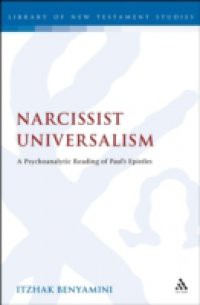For several decades Paul's epistles have been right at the focus of academic and philosophic debate regarding the questions pertaining to Jewish law; love in relation to the law; the linkage between Judaism and Christianity, and so on. What do Paul's writings consist of that can be used as a key for understanding Western Culture? Itzhak Benyamini seeks to re-read Paul's epistles using a critical psychoanalytical approach in light of Jacques Lacan's theory, in order to find which unconscious core this text provides us with. Benyamini examines Paul's use of Christian ritual and concomitant authoritative evocation of the Biblical tenet Love thy Neighbor, in order to establish a communal Christian identity, separate from 'carnal' Judaism and idolatry alike. According to Benyamini, Paul has founded a narcissist community of sons who place the Son at the centre of their existence. Consequently, the Christian Imaginary is juxtaposed as an alternative to pagan-carnal pleasure - but also as alternative to Judaic law.

